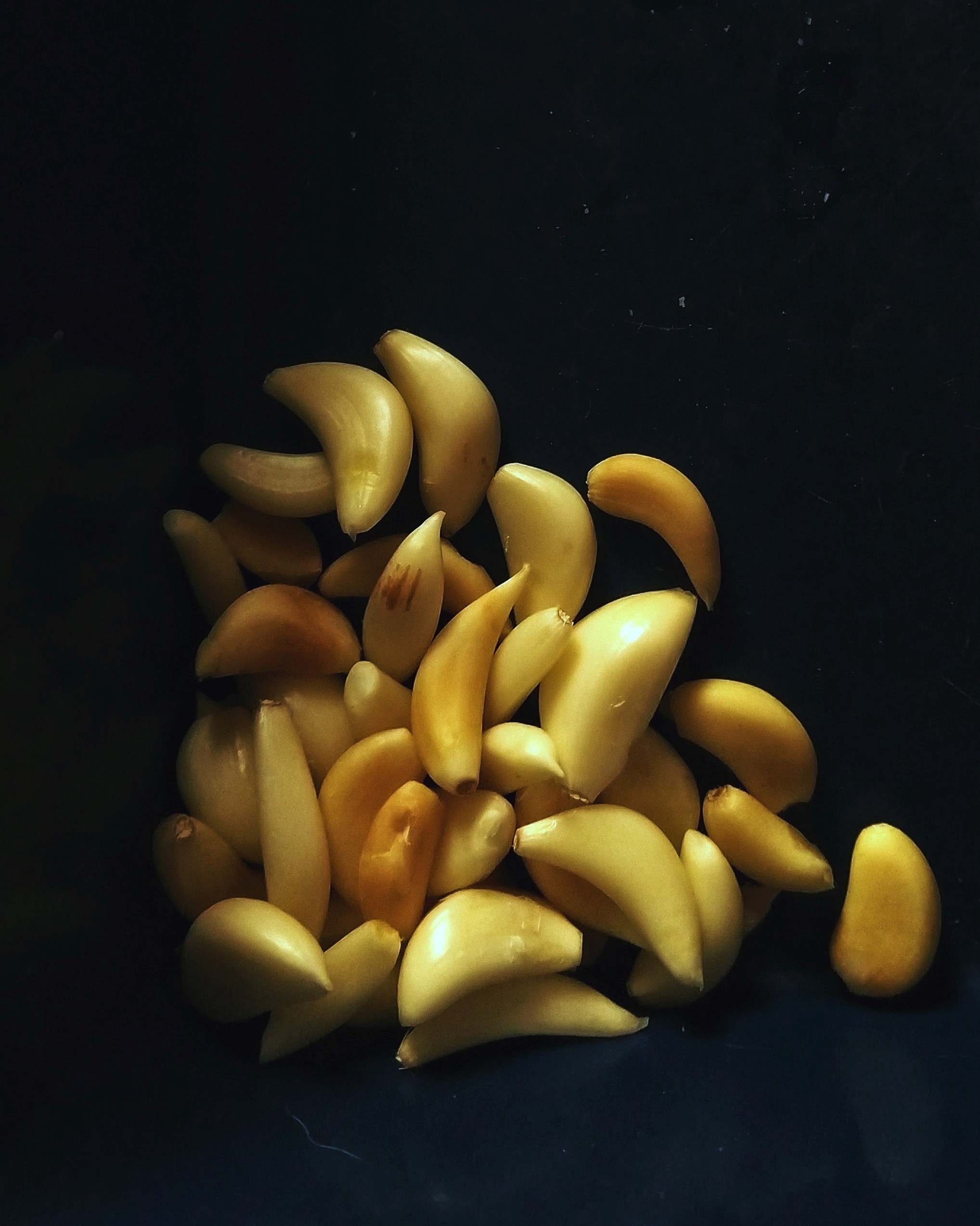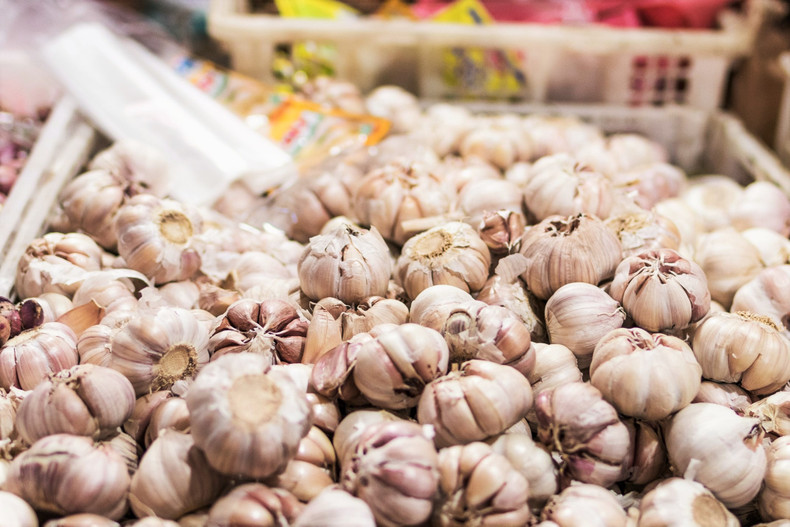
The History of Garlic
Garlic is one of the oldest known foods and has been consumed by humans for several thousand years dating back to 2600-2100 BC. Its roots began in China, Japan, and Korea. From there it migrated to the coasts of the Mediterranean Sea and then Great Britain. Today, it is one of the most popular medicinal foods in the world. Garlic is used across the globe, including India, Egypt, and Israel, for its nutritional and culinary value, as well as its medicinal properties. Close relatives to garlic include onion, shallot, leeks, and chives.
Garlic for Nutrition
Garlic, which is categorized as a vegetable, contains high levels of sulphur and vitamin B1 (thiamine), both of which nourish the skin. And because Vitamin B1 changes the body odor, it is a popular addition to supplements to help resist or repel insects including flies and ticks. Garlic also contains the essential minerals of calcium, phosphorus, manganese, and selenium, as well as a high content of Vitamin C. There is also germanium in it; a lesser known but still important mineral with antioxidant properties that heals wounds, strengthens the immune system, and has been used in cases of cancer.
Garlic as Medicine
Garlic contains allicin, a phytonutrient which breaks down to form a variety of organosulfur compounds, compounds which give garlic a number of therapeutic effects. Garlic is widely used for bacterial infections, yeast infections, viruses, colds, flus, immune problems, respiratory conditions, toothaches, abscesses, a lack of appetite, and low vitality. In war-time Russia, garlic was known as “Russian penicillin” because it was so effective in treating wound infections. In more recent times we have learned that garlic is also an effective blood thinner and helps to reduce high blood pressure as well as cholesterol. There is also an association between the intake of garlic and the reduction of certain cancers.
All this considered, garlic makes an excellent tonic.
Garlic is also thought to ward off ghosts and negative energies and can be used for those people or animals who are prone to attracting entities that deplete their life force.
Garlic as Horse Medicine
It seems that everyone is passionate about garlic! There are garlic lovers and there are garlic haters. Especially when it comes to feeding it to horses! In fact, one of my Facebook posts on garlic was in the top ten posts ever for record engagements. Whew! That’s a lot of passion over garlic. The conversation went on for days.
Garlic lovers see a lot of positive changes in their garlic-eating horses. Garlic can help horses with digestive upsets, leaky gut, respiratory problems, infections, skin problems, and overall malaise. It is also an excellent general detoxifier. Garlic can also be used as a poultice on abscesses, wounds, and joint infections.
What The Studies Say
Some horse folks are fearful to feed garlic because of its reported effects on red blood cells. But studies are sparse and often unreasonable and inconclusive. One study showed that high quantities of garlic over several weeks can lead to anemia, i.e., a reduction in red blood cells. The study included four horses and two of them were controls which meant that only two horses ate the garlic which was fed in freeze dried form. These two horses were given .1 grams/kg of body weight (approximately 45 grams in total) every day to start which was then gradually increased to .5 grams/kg (approximately 227 grams in total) of garlic over 41 days. This higher dosage was then continued for another 30 days for a total of 71 days.
This means that a one-thousand-pound horse would have been fed the equivalent to 7 medium cloves of raw garlic for the first 6 weeks and then up to 38 medium cloves of raw garlic for another month!
And so, perhaps of no surprise, after 2-1/2 months of these toxic doses the horses’ blood work showed a type of anemia called Heinz body anemia but no other visible signs of physical symptoms or other health problems. Symptoms of anemia can include fatigue, muscle weakness, loss of appetite, pale gums, and yellowish eyes. In any case, within 5 weeks of discontinuing the garlic, all of the blood work returned to normal.
Link to resource: https://pubmed.ncbi.nlm.nih.gov/15822591/
Another study used 250 grams per day on 1,000-pound horses with the same results.
Now I don’t know about you, but I don’t know why any sensible horse person would feed their beloved horses these kinds of toxic dosages. It defies common sense. Few vegetables or plants would NOT be toxic if fed in this way. It’s all about the dose. Horses are very sensitive and do not need to be overdosed with anything for it to work.
According to the National Research Council in 2008, a presumed safe intake for horses is 90 mg/kg (= .09 grams) of body weight per day (6 raw cloves) and a historically safe intake is 15 mg/kg (.015 grams) of body weight per day (1 raw clove).
Meanwhile Health Canada has approved garlic for all equine supplements, with a precaution to not feed to any horses with a bleeding disorder. Fair enough.
Garlic as People Medicine
The effects of garlic on red blood cells are not exclusive to horses, it has the same effects on humans, and dogs too. In fact, it is these chemical properties that make it such an excellent antioxidant to improve circulation and reduce blood pressure. And so, while some people may be nervous about its supposedly adverse effects on horses, many of these same people are eating lots of garlic for themselves. But no one is worried about the same potentially toxic effects on people because they are focused on the benefits. In fact, the world production of garlic for human consumption is over 25 million tons! That’s a lot of garlic!
My own mother took garlic every day for many years and credited it for her strong immune system. Good thing she didn’t live in ancient Greece though, the authorities of the time forbade anyone who smelled like garlic from entering their sacred temples.
How to Feed Garlic to Horses

Horses are also garlic lovers and garlic haters, although most of them really like it. They must know that garlic has a long history of helping people and animals with its nutritional, medicinal, and therapeutic benefits. So, we side with both the horses and Health Canada and highly recommend it for equine medicinal purposes where indicated. But like all medicinal herbs and supplements, it should only be given if the benefits are obvious, and of course it should not be given over long periods of time as in months or years. A shorter duration will not only prevent any kind of toxic effects, but it will avoid desensitization where the body no longer responds to it in a positive way. Most herbs or supplements, if given for longer than is needed, will lose their potency. So, it is always best to use herbal plants or vegetables temporarily as indicated for specific situations.
The Garlic Equine Dosage
Raw garlic is the best and most potent form. Feed 2-3 medium or large cloves daily for 2-3 weeks or less if the condition improves. And if your horse doesn’t like the taste or stops eating it take that as a sign that your horse is finished with it. My own horses let me know when they have had enough because they start to flip the cloves out of their dish. This is usually after about 2 weeks of 2-3 garlic cloves per day. Horses know best!
~ Stop and Smell the Garlic ~

Marijke van de Water, B.Sc., DHMS
Equine
Health Nutrition Specialist
Homeopathic Practitioner
Medical Intuitive & Healer
Educator & Author
Marijke is a life-long horse lover, the author of the best-selling Healing Horses Their Way, and the founder, formulator, and CEO of Riva’s Remedies. She is a gifted healer who helps horses, and their people, from around the world live happier, healthier lives.

